The Leading Edge: January 2023 Wind Energy Newsletter
In this edition, NREL releases 2022 wind energy accomplishments, leadership discusses the past year, and we share awardees, project updates, and tool upgrades.
News Stories
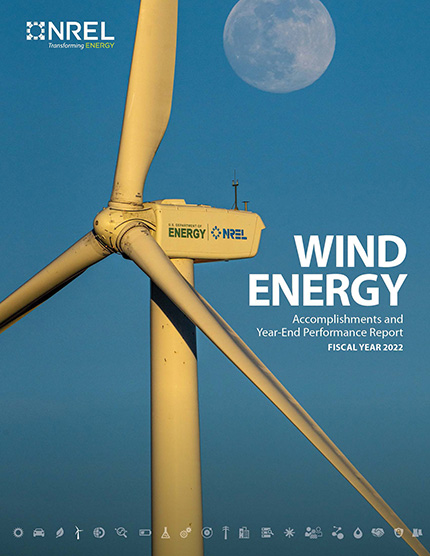
2022 Accomplishments
The National Renewable Energy Laboratory's (NREL's) wind energy research and development team accomplished a lot in 2022. In summary of the fiscal year’s accomplishments, NREL has just released its annual accomplishments report.
Here are a few highlights from the year, based on the articles you clicked on the most in our monthly newsletter:
A New Study AWAKENs a Chance To Save Wind Power Plants Millions
NREL Releases Report on Energy Storage
The Future of Distributed Wind Energy: Unlocking Terawatt-Level Potential
NREL Model Can Help Golden Eagles Soar Safely Around Wind Turbines
NREL Outlines First Floating Offshore Wind Energy Leasing Areas off West Coast
Premier Wind Energy Technical Conference Highlights NREL Research
Industry To Help Prepare High-Fidelity ExaWind Model for Commercial Use
U.S. Offshore Wind Energy Market Set To Surge
New Floating Offshore Wind Energy Prize To Accelerate Domestic Supply Chain
Wind Turbine With Advanced Controls Used in Grid-Forming Test by NREL and General Electric
Reasons Behind the Workforce Gap in Wind Energy.
Our "Behind the Blades" profiles—which launched this past fiscal year to spotlight the people at NREL behind wind energy news, research, and tools—were also among the most-read newsletter features. Throughout the year, we highlighted, among others:
Women in wind energy science, computation, and engineering for Women's History Month
Interns who supported research during the summer
An administrator keeping wind turbines turning
To catch up on other news and publications you may have missed in 2022, head to our newsletter archives, our newsfeed, and our publications page.
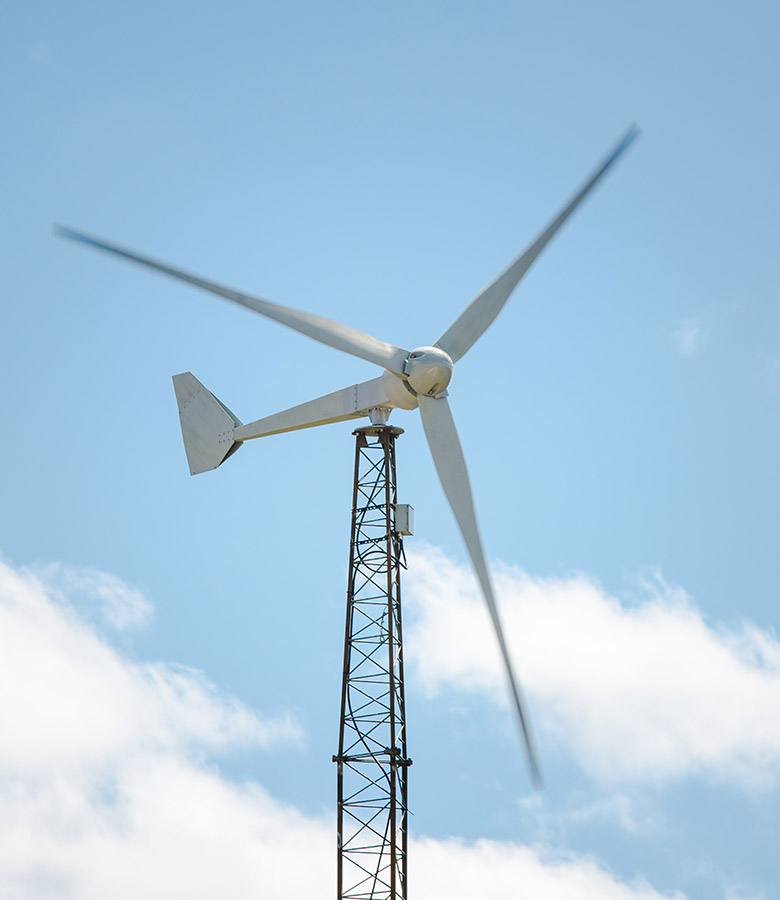
Bergey Windpower Co. has received several Competitiveness Improvement Project awards since 2012. By 2022, the Bergey Excel 15 wind turbine had doubled its rated annual energy production, which reduced the levelized cost of energy by more than 50%. Photo from Bergey Windpower Co.
Manufacturers of Small- and Medium-Sized Wind Turbine Technology Awarded 2022–2023 Funding
The U.S. Department of Energy (DOE) and NREL announced the 12 projects selected from the November 2022 request for proposals submissions for 2022–2023 Competitiveness Improvement Project (CIP) awards to help manufacturing companies make distributed wind energy technology less than 1 MW in capacity more cost-competitive and reliable. Bergey Windpower Co., for example, lowered costs by 50% with its 15-kW wind turbine with CIP’s support. After these project agreements are finalized, NREL will have awarded 64 subcontracts to 26 companies, totaling $15.4 million of DOE funding, while leveraging $7.9 million in additional private-sector investment since CIP began in 2012. The next request for proposals is planned for 2024.
Road Map Identifies Pathways To Develop a U.S. Offshore Wind Energy Supply Chain
A team of NREL researchers, industry partners, and other wind energy stakeholders has identified road maps to develop and sustain an offshore wind energy supply chain. The results were published in a report announced on Jan. 23, 2023, by the National Offshore Wind Research and Development Consortium. This report, building on a previous report from March 2022, summarizes the major barriers to the supply chain development and expansion needed to meet the Biden administration's goal of 30 GW of offshore wind energy installed by 2030. It also presents potential solutions—including a timeline of components, vessels, ports, facilities, and workforce investment needs, activities, and opportunities—to develop resilient, sustainable, and equitable manufacturing capabilities in the United States.
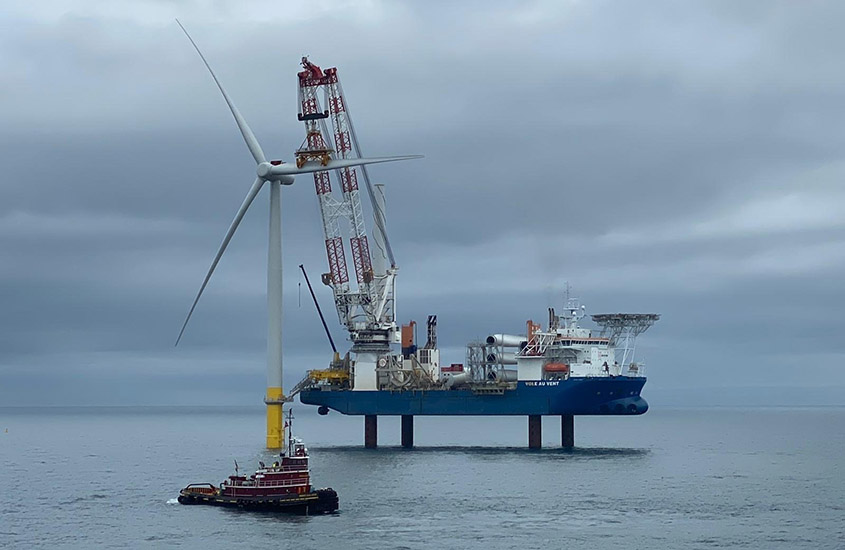
Behind the Blades

"NREL's wind team will continue to work with our partners to address the grand challenges in the research and development of wind energy to support national renewable energy goals," said Brian Smith. Photo by Brian Smith and NREL
Leadership Reflects on 2022
NREL's wind energy leadership reflected on 2022 accomplishments and what they're excited about in 2023.
"I’m excited to share NREL's contributions to advancing wind energy science, technology, and deployment," said Brian Smith, the lab's wind energy program manager about the new accomplishments report.
Smith is also looking forward to the next year's contributions to this expanding form of clean energy. "Wind energy is playing a critical and growing role in the U.S. clean energy future,” he said. "NREL's wind team will continue to work with our partners to address the grand challenges in the research and development of wind energy to support national renewable energy goals."
Those goals, such as the Biden administration's efforts to reach 100% clean energy by 2035 and 30 GW of offshore wind energy by 2030, are aggressive. But the accomplishments report shows the breadth and number of projects the NREL team is working on to help reach those milestones.
On the Radar
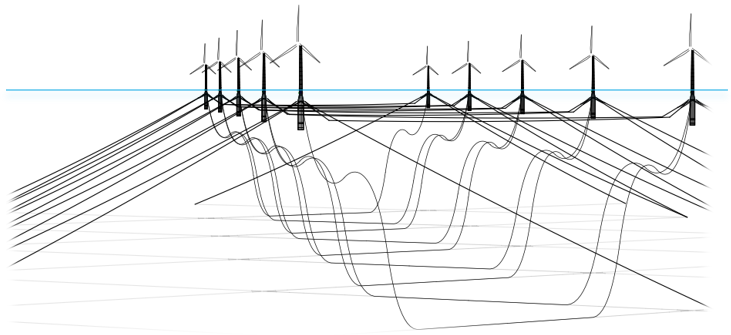
NREL’s modeling tool for wind turbine arrays, FAST.Farm, now enables users to simulate shared mooring systems that interconnect floating offshore wind turbines. Graphic by NREL
FAST.Farm Now Able To Simulate Floating Offshore Wind Farms With Shared Mooring Lines
New capabilities in NREL's FAST.Farm, a publicly accessible multiphysics tool for the coupled simulation of wind turbine arrays, allow users to simulate floating offshore wind farms with shared mooring systems. Shared mooring systems use mooring lines to tether floating wind turbines directly together, minimizing the number of anchors required. This reduces mooring system material use, cost, and impact on the seabed. The recently released simulation capabilities make it possible for researchers and designers to simulate complete floating wind farms, including the coupling effects of shared mooring lines and power cables, enabling more comprehensive research in this growing area of wind energy research and development. The recent upgrades were made through the Shared Mooring Systems for Deep-Water Floating Wind Farms project, the first project awarded by the National Offshore Wind Research and Development Consortium.
2021 Cost of Wind Energy Review Now Available
NREL's 11th annual cost of wind energy review, now presented in slide deck format, uses representative utility-scale and distributed wind energy projects to estimate the levelized cost of energy for land-based and offshore wind power plants in the United States.
New Model Offers Approach to Estimating the Future Cost of Offshore Wind Energy
In a new report, NREL researchers introduce the Forecasting Offshore Wind Reductions in Cost of Energy (FORCE) model (available publicly on GitHub), which can estimate cost reductions of fixed-bottom and floating offshore wind energy technologies. FORCE uses a learning curve approach based on historical project cost data and provides standardized and transparent methods for projecting future costs. It provides estimates of forecasting uncertainty and flexibility to accommodate new data or assumptions. The authors use the FORCE model to estimate that the average levelized cost of energy of fixed-bottom offshore wind projects in the United States could decrease from $75.1/MWh to $53.1/MWh in 2035 with an uncertainty range of $48.4/MWh–$59.7/MWh. Similarly, the average levelized cost of energy of floating offshore wind projects in the United States could decrease from $207/MWh to $63.9/MWh in 2035 with an uncertainty range of $46.5/MWh–$99.9/MWh.
AWAKEN's Field-Data-Streaming Setup Nears Completion
The American WAKE experimeNt (called AWAKEN for short), an international, multi-institutional effort to amass the most comprehensive wind energy wake data set to date, is well underway. Instruments now installed at eight dispersed field sites across Northern Oklahoma have been streaming real-time data as of late September 2022. The data are being uploaded in near-real time to DOE's Atmosphere to Electrons Data Archive and Portal. Final agreements are being processed to deploy data-collecting instruments on individual wind turbines at three remaining remote field sites with the setup expected to be fully complete in February 2023. At that time, many data streams and observations will be publicly available and wind farm control studies will commence.
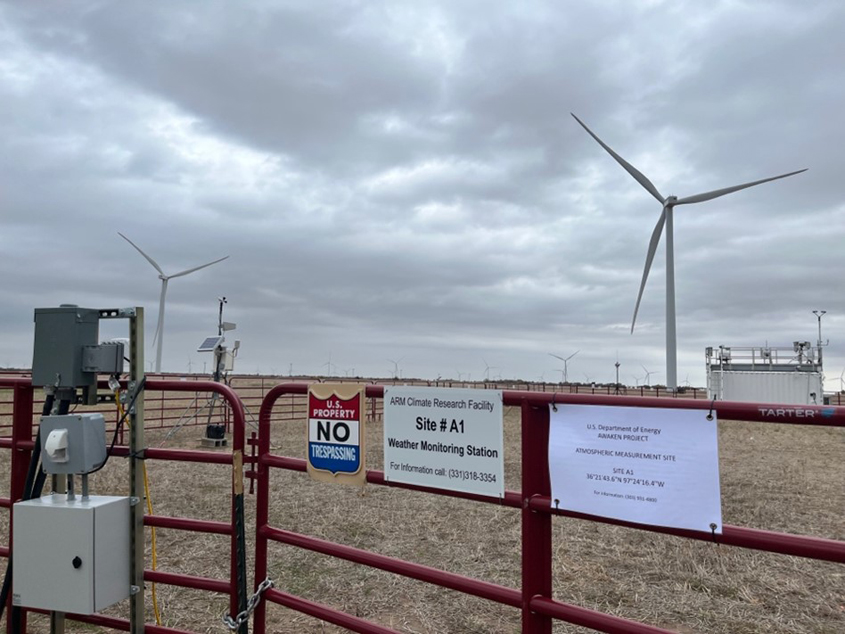
A photo of one of AWAKEN's remote sensing field sites in Northern Oklahoma. Image by Nicola Bodini, NREL
NREL Researcher Awarded for Contributions to Development of Floating Offshore Wind Energy
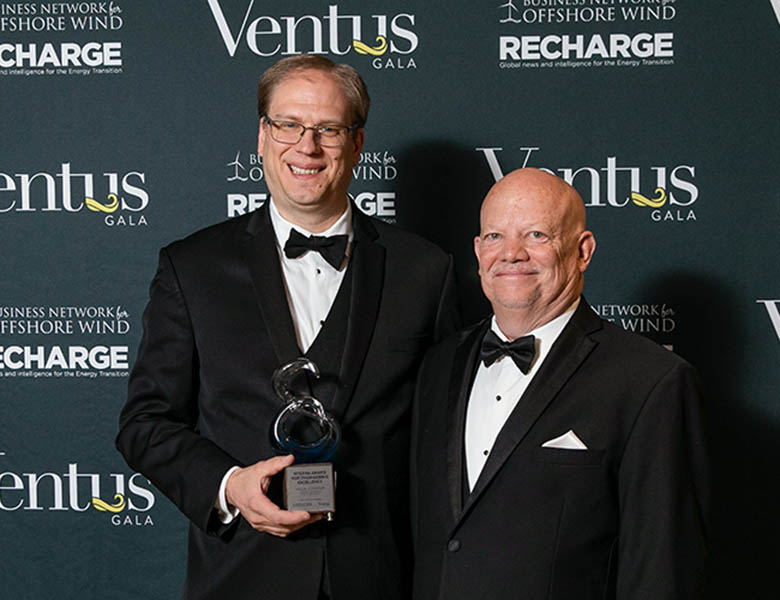
The Business Network for Offshore Wind recognized NREL researcher Jason Jonkman’s contributions to advancing the development of floating offshore wind energy. Image from The Business Network for Offshore Wind
In honor of his contributions to the advancement of floating offshore wind energy, NREL researcher Jason Jonkman recently received the 2022 Viterna Award for Engineering Excellence from the Business Network for Offshore Wind (BNOW). In November 2022, Jonkman attended BNOW's second annual Ventus Awards Gala in Washington, D.C., where he was recognized for developing NREL's FAST software, a first-of-its-kind engineering tool for simulating the coupled dynamic response of wind turbines.
"Jason Jonkman's perseverance and forward-thinking research has directly contributed to the development of floating offshore wind," said Liz Burdock, president and CEO of BNOW. "His development of FAST, one of the world's first engineering computer design tools, helped launch the first generation of floating offshore wind turbines and continues to serve the industry today."
As the once-distant reality of floating offshore wind energy has taken off, Jonkman and his NREL research team have worked to greatly expand the functionality of the original software to its latest version, called OpenFAST. Jonkman and team are now also working to develop FAST.Farm, a new software aimed at predicting power production and structural loading of wind turbines within a wind farm.
"I'm honored to receive this award alongside my peers," said Jonkman, "and I look forward to continuing this important work to bring floating offshore wind to commercial maturity."
NREL Co-Hosts Wildlife and Wind Energy Webinar Series
Join NREL and the Renewable Energy Wildlife Institute for the Technology and Innovation in Wind and Wildlife Webinar Series, at which several NREL wind energy researchers will be speaking. Register or watch the recording for any or all of the four hour-long webinars:
Jan. 26, 2023, Recorded: The Future of Wind Energy Technology and Wildlife Considerations
Jan. 31, 2023, 3–4 p.m. ET, Virtual: Technology Acceptance Workshop Results: From the Bench to the Field
Feb. 9, 2023, 4–5 p.m. ET, Virtual: Technology Acceptance Workshop Results: Acceptance
Feb. 16, 2023, 2–3 p.m. ET, Virtual: Wind Wildlife Research Meeting Technology and Innovation Discussions Continued.
Downwind: In Case You Missed It
Wind Resource Maps of All 50 States
With the addition of Alaska, NREL has now created wind resource maps for all 50 states at a height of 100 meters for DOE’s Wind Energy Technologies Office’s WINDExchange.
International Energy Agency Wind 2021 Annual Report Details U.S. Research and Industry
The International Energy Agency Wind Technology Collaboration Programme (IEA Wind) recently released its 2021 annual report. Of IEA Wind's 24 wind energy research tasks in 2021, NREL's researchers participated in 21 and led 12. Additionally, NREL Wind Energy Laboratory Program Manager Brian Smith served as the U.S. alternate member, treasurer, and vice chair of communication, education, and engagement of the IEA Wind leadership team.
Symphonic Electronics: NREL Engineers Use Music To Illustrate Grid Stability
For NREL engineers who try to harmonize renewable power on the grid, the waveforms and frequencies they see when analyzing grid stability inspired a musical take on their research. Instead of injecting power signals into the hardware, the engineers sent in famous melodies and movie soundtracks—just frequencies, after all—causing the hardware to hum metallic-sounding tunes. These singing inverters and load banks show a more literal sort of grid harmony, and they draw attention to NREL's highly unique capabilities in validating grid stability for power systems with more electronics and renewables.
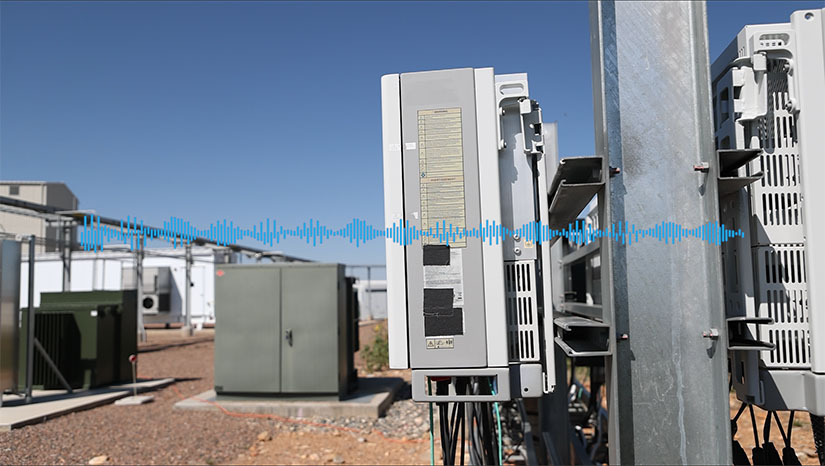
NREL in the News
U.S. Must Invest $22.4B in Domestic Supply Chain To Reach 30 GW of Offshore Wind Goal: Report, Emma Penrod, Utility Dive, Jan. 24, 2023
- Similar coverage from CleanTechnica
Clean Energy to Communities Program Launches: Stakeholder-Informed Program Meets Communities Where They Are, Brooke Van Zandt, NREL, Jan. 18, 2023
Composites End Markets: Energy (2023), Hannah Mason, Composites World, Jan. 4, 2023
Boralex Acquires 50% Stake in Five Wind Farms With 894 MW Capacity, Gautamee Hazarika, Mercom Clean Energy Insights, Jan. 2, 2023
Top 20 NREL Stories of 2022, Allison Montroy, NREL, Dec. 28, 2022
Tennessee Has Massive Wind Energy Potential. Why Is Nobody Talking About It?, Caroline Eggers, 90.3 WPLN News, Dec. 27, 2022
DOE To Award Nearly $3 Million to U.S. Small-Scale Wind R&D, WPED Staff, Windpower Engineering & Development, Dec. 15, 2022
Transmission Needed To Carry Wind Power From the Central U.S. Eastward, DOE Finds, William Driscoll, PV Magazine, Dec. 7, 2022
California Offshore Wind Auction Is Second-Biggest in Clamor for Renewable Power, Jennifer A. Dlouhy, Bloomberg, Dec. 7, 2022
Boston Is the Hub of Green Energy, but Offshore Wind Can’t Only Exist in the Northeast, Experts Say, Cynthia McCormick Hibbert, Northeastern Global News, Dec. 6, 2022
Wind Energy Industry Struggles To Find Qualified Workers: NREL, Diana DiGangi, Utility Dive, Dec. 1, 2022
Publications
Workforce
2021 Cost of Wind Energy Review, NREL Technical Report (2022)
Curled-Skewed Wakes Behind Yawed Wind Turbines Subject to Veered Inflow, Energies (2022)
Design and Analysis of a 10-Turbine Floating Wind Farm With Shared Mooring Lines, Journal of Physics: Conference Series (2022)
Distributed Renewables for Arctic Energy: A Case Study, NREL Technical Report (2023)
Parked Aeroelastic Field Rotor Response for a 20% Scaled Demonstrator of a 13-MW Downwind Turbine, Wind Energy (2022)
Rating of a Pitch Bearing for a 1.5-Megawatt Wind Turbine, NREL Technical Report (2022)
The Sensitivity of the Fitch Wind Farm Parameterization to a Three-Dimensional Planetary Boundary Layer Scheme, Wind Energy Science (2022)
Energy Potential
Assessment of Wind Energy Resource Potential for Future Human Missions to Mars, Nature Astronomy (2022)
Great Lakes Wind Energy Feasibility Study, New York State Energy Research and Development Authority (2022)
Software and Tools
A Systematic Framework for Projecting the Future Cost of Offshore Wind Energy, NREL Technical Report (2022)
Seabed Bathymetry and Friction Modeling in MoorDyn, Journal of Physics: Conference Series (2022)
The Revised FLORIDyn Model: Implementation of Heterogeneous Flow and the Gaussian Wake, Wind Energy Science (2022)
A Mass–Momentum Consistent Coupling for Mesh-Adaptive Two-Phase Flow Simulations, Computers & Fluids (2022)
Technology
Acoustic Travel-Time Tomography for Wind Energy, NREL Technical Report (2022)
Can Lidars Assess Wind Plant Blockage in Simple Terrain? A WRF-LES Study, Journal of Renewable and Sustainable Energy (2022)
Deployable Wind Power for Defense and Disaster Response Workshop Summary, Sandia National Laboratories Technical Report (2022)
Want More?
Subscribe to The Leading Edge newsletter, and explore the latest news and accomplishments in wind energy at NREL.
Share

